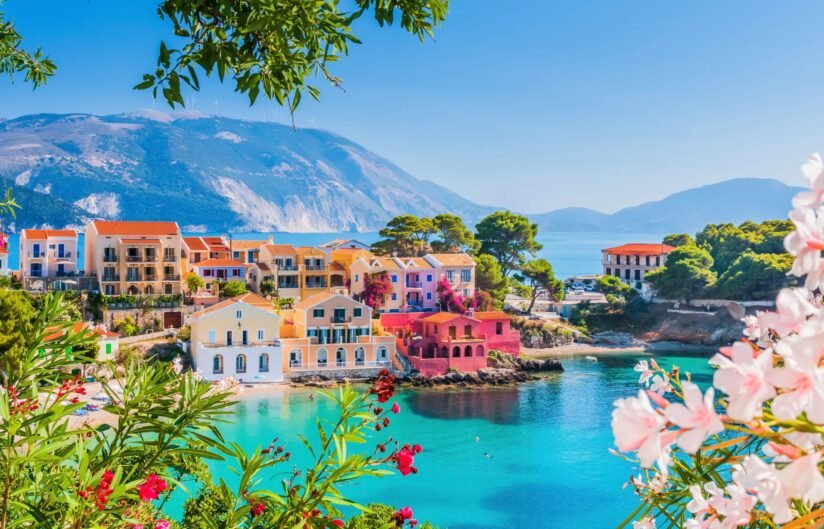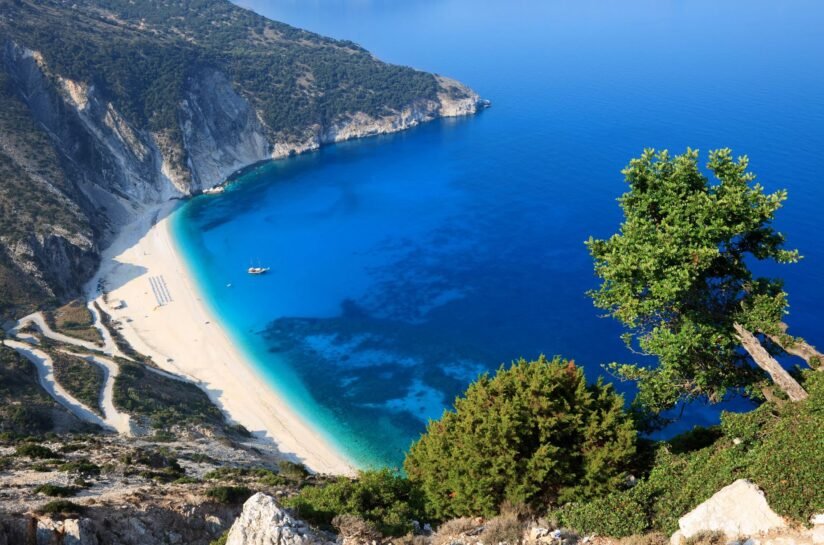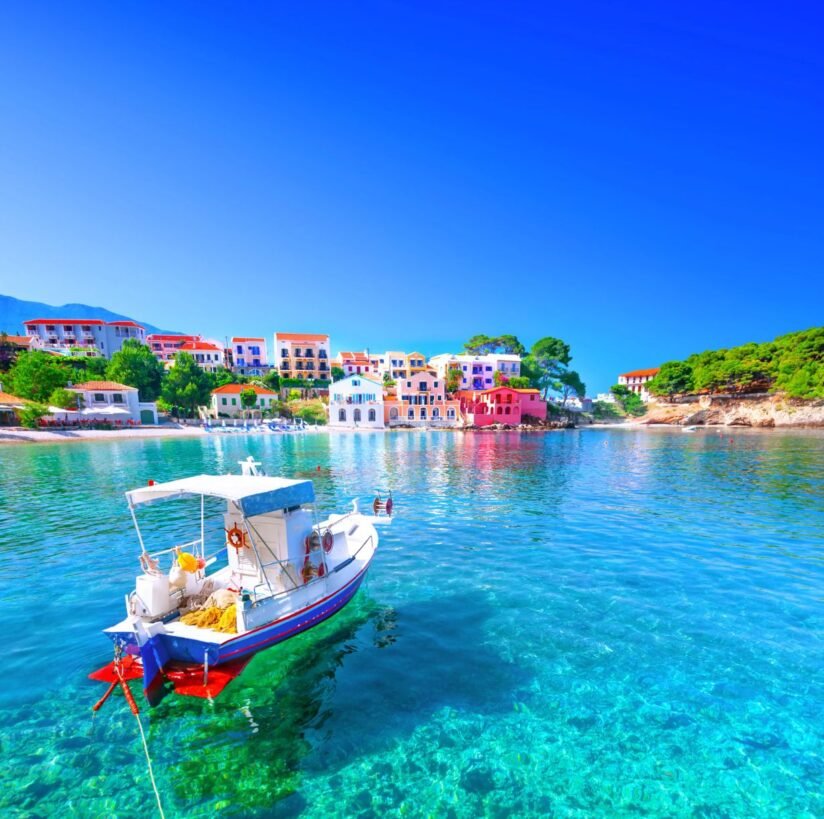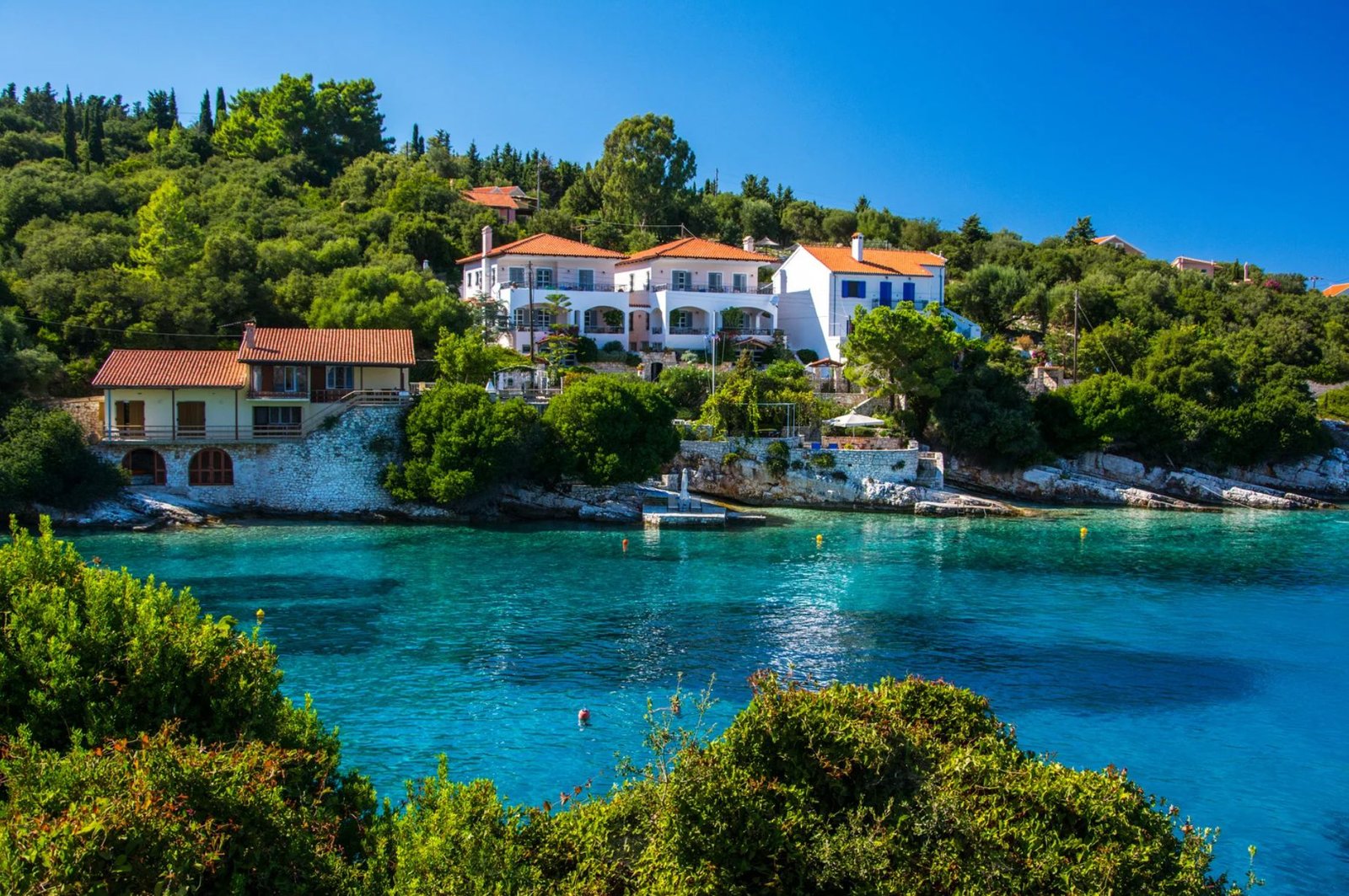Nestled in the Ionian Sea, Kefalonia is a island that offers a unique blend of natural beauty, rich history, and authentic culture. Unlike its more frequented neighbors, Santorini and Zakynthos, Kefalonia remains a tranquil haven, ideal for travelers seeking a more relaxed and immersive experience.
The island’s diverse landscapes range from lush mountains and verdant forests to pristine beaches and charming villages. Its relatively low tourist density allows genuine interactions with locals and unspoiled exploration.
Whether you’re a solo adventurer, a couple seeking romance, or a family on vacation, Kefalonia caters to all. Its scenic beauty, cultural richness, and warm hospitality make it a must-visit destination in 2025.
Where Is Kefalonia Located?
Kefalonia is the largest of the Ionian Islands, situated off the western coast of mainland Greece. Approximately 260 kilometers west of Athens, it’s neighbored by islands like Ithaca and Zakynthos.
The island’s strategic location makes it accessible yet secluded, offering both convenience and tranquility. Its proximity to other islands makes it an excellent base for island-hopping adventures.
Kefalonia’s unique position is a gateway to exploring the Ionian Sea’s myriad treasures, from hidden coves to historical sites.

How to Get to Kefalonia
By Flight
Kefalonia International Airport (EFL) connects the island to major Greek cities and several European destinations. Direct flights from cities like London, Rome, and Frankfurt are available during the summer months.
For travelers from Athens, multiple daily flights make the journey quick and convenient. Upon arrival, car rentals and taxis are readily accessible at the airport.
By Ferry
Ferries to Kefalonia operate from several ports:
- Kyllini Port: The primary mainland connection, with regular services to Poros and Sami.
- Patras Port: Offers routes to Sami, especially during peak seasons.
- Zakynthos and Ithaca: Inter-island ferries facilitate easy travel between neighboring islands.
Booking tickets in advance, especially during summer, is advisable to secure preferred schedules.
How to Get Around Kefalonia
Car Rental
Renting a car is the most flexible way to explore Kefalonia. International visitors can rent vehicles without an International Driving Permit (IDP). It’s recommended to book in advance, especially during peak tourist seasons.
Taxis and Transfers
While ride-sharing services like Uber are unavailable, local taxis and private transfer services are abundant. Pre-booking transfers can ensure timely pickups and fixed rates.
Public Transportation
The island’s bus network connects major towns and tourist spots. However, schedules may be limited, so it’s essential to plan accordingly.
Tours
For those preferring guided experiences, various tours are available:
- Boat Tours: Explore hidden beaches and coastal landmarks.
- Bus Tours: Ideal for covering multiple attractions in a day.
- Private Tours: Customized itineraries for a more personalized experience.
Where to Stay in Kefalonia
Kefalonia offers diverse accommodations to suit different preferences:
- Argostoli: The island’s capital, bustling with shops, restaurants, and cultural sites.
- Assos: A picturesque village known for its Venetian castle and serene ambiance.
- Fiskardo: A charming harbor town with colorful buildings and vibrant nightlife.
- Agia Efimia: A tranquil fishing village, perfect for a peaceful retreat.
Booking accommodations in advance, especially during summer, ensures a broader selection and better rates.
Top Kefalonia Island Tours
Exploring Kefalonia through organized tours can enhance your experience:
- Melissani and Drogarati Caves Tour: Discover the island’s geological wonders.
- Beach Hopping Boat Tour: Visit secluded beaches like White Rocks and Koutsoupia.
- Wine and Olive Oil Tasting Tour: Experience local flavors and traditional production methods.
These tours often include knowledgeable guides, transportation, and sometimes meals, providing a comprehensive experience.
Things to Do in Kefalonia
Kefalonia boasts a plethora of activities for all interests:
- Melissani Cave Lake: Visit between 11:30 AM and 1:00 PM to witness the mesmerizing light rays.
- Antisamos Beach is famous for its crystal-clear waters and lush surroundings.
- Myrtos Beach is renowned for its dramatic cliffs and turquoise waters.
- Assos Village: Explore the Venetian castle and enjoy local cuisine.
- Fiskardo Village: Stroll through the harbor, visit the lighthouse, and dine at seaside tavernas.
- Fteri Beach: Accessible by boat or hike, offering serene beauty.
- Petani Beach: Ideal for sunset views and photography.
- Local Taverns: Savor traditional dishes like the Kefalonian meat pie.
These activities provide a well-rounded experience of the island’s natural and cultural offerings.

Best Photo Spots in Kefalonia
Capture the island’s beauty at these locations:
- Melissani Lake: The interplay of light and water creates stunning visuals.
- Myrtos Viewpoint: Offers panoramic views of the beach and sea.
- Assos Village: Colorful houses and the castle provide picturesque scenes.
- Petani Beach at Sunset: A perfect spot for golden hour photography.
- Fiskardo Harbor: Vibrant boats and waterfront cafes make for lively shots.
Remember to respect local regulations, especially when using drones, and always seek permission when necessary.
Best Beaches in Kefalonia
Kefalonia’s coastline is dotted with diverse beaches:
- Family-Friendly: Kalamia, Xi, and Makris Gialos offer gentle waters and amenities.
- Secluded Gems: Koutsoupia and Platia Ammos are perfect for solitude seekers.
- Snorkeling Spots: Antisamos and Fteri boast clear waters teeming with marine life.
- Sunset Views: Petani Beach provides breathtaking evening vistas.
Each beach offers a unique experience, catering to different preferences and activities.
Interactive Map of Kefalonia
Utilize online maps to plan your journey:
- Google Maps: Mark key attractions, beaches, and accommodations.
- Offline Maps: Download maps for areas with limited connectivity.
Having a visual guide aids in efficient itinerary planning and navigation.
Kefalonia Travel Tips
- Currency: Euros (€) are used; ATMs are widely available.
- Language: Greek is the official language, but English is commonly spoken in tourist areas.
- Water: Tap water is generally safe, but bottled water is recommended.
- Health: Carry mosquito repellent, especially during summer months.
- Safety: Kefalonia is considered very safe for travelers.
- Driving: Drive on the right side; roads can be narrow and winding.
Being prepared with these tips ensures a smooth and enjoyable trip.
Is Kefalonia Safe?
Yes, Kefalonia is known for its safety and low crime rates. Locals are hospitable, and the island maintains a relaxed atmosphere. Standard precautions, like safeguarding valuables, are recommended as with any travel destination. However, Kefalonia is considered a safe island for solo travelers, couples, and families.
Police presence is minimal but effective, and locals are often quick to help if you encounter any issues. For added security, keep a copy of your passport, have travel insurance, and be cautious when hiking remote trails or driving unfamiliar routes. Respect nature and the environment, and your experience will be nothing short of spectacular.

Is Kefalonia Worth Visiting?
Kefalonia is a hidden treasure that many travelers overlook in favor of more commercial Greek destinations like Santorini or Mykonos. But that’s what makes it so special.
Kefalonia offers:
- Authentic Greek culture without touristy gimmicks
- Unspoiled beaches with turquoise waters
- Historical landmarks like Venetian castles and ancient monasteries
- Natural wonders like the Melissani Lake and Mount Ainos National Park
- Delicious local food and traditional hospitality
Whether you’re into photography, hiking, beach lounging, or cultural immersion, Kefalonia provides a little of everything. And because it’s not overrun with mass tourism, your experiences here feel more personal, genuine, and serene.
Best Time to Visit Kefalonia
The best time to visit Kefalonia depends on what kind of experience you’re looking for:
- May to June: Warm weather, blooming landscapes, and fewer tourists are ideal. Perfect for nature walks and quiet beach days.
- July to August: Peak tourist season. Expect hot weather, vibrant nightlife in Argostoli and Fiskardo, and fully operational tours and services.
- September to October: A sweet spot — the crowds thin out, the sea is still warm, and the pace is calm. Harvest season also means fresh olives and wine!
- November to April: The off-season. Some businesses close, but this could be your peaceful escape if you enjoy tranquility and don’t mind cooler temperatures.
5-Day Kefalonia Itinerary Example
Here’s a suggested 5-day itinerary to help you make the most of your visit:
Day 1: Arrival & Explore Argostoli
- Walk around Lithostroto Street
- Visit the Archaeological Museum
- Dine at a seaside taverna.
Day 2: Beach & Nature
- Morning at Myrtos Beach
- Drive to Assos Village
- Sunset at Petani Beach
Day 3: Eastern Coast Adventure
- Tour Melissani Cave & Drogarati Cave
- Swim at Antisamos Beach
- Evening in Agia Efimia
Day 4: Northern Charm
- Visit Fiskardo
- Hike to Foki Beach
- Dinner with harbor views
Day 5: Culture & Relaxation
- Stop at Robola Winery Cooperative
- Explore Saint Gerasimos Monastery
- Final beach stop at Makris Gialos
Local Foods to Try in Kefalonia
Greek food is a highlight of any trip, and Kefalonia has its unique offerings:
- Kefalonian meat pie (Kreatopita) – a must-try local delicacy
- Bourbourelia – a traditional bean soup
- Robola wine – a crisp, local white wine
- Grilled octopus and fresh seafood
- Baklava and mandolates (sugar-coated almonds) for dessert
Tavernas are family-run and emphasize fresh, local ingredients. Don’t be shy about asking the server what’s fresh or in season — it’s often the best dish of the day!
Cultural Insights & Etiquette
- Greet with a warm “Yassas” (Hello)
- Tipping is appreciated but not mandatory — rounding up or leaving 5–10% is customary
- Dress modestly when visiting churches or monasteries
- Respect local traditions and take time to engage in conversations; Kefalonians are proud of their heritage
Sustainable Travel in Kefalonia
Kefalonia has managed to retain its natural beauty, and travelers can help preserve it by:
- Avoiding single-use plastics
- Supporting local businesses and tour guides
- Staying in eco-friendly accommodations
- Respecting wildlife and not littering, especially on trails and beaches
Wrap-up: Why Kefalonia Should Be Your Next Island Getaway
Kefalonia is more than just a Greek island — it’s a tapestry of experiences that weave together ancient history, unspoiled nature, and heartfelt hospitality. Whether lounging on white sand beaches, exploring hidden caves, or savoring homemade moussaka in a mountain village, every moment here feels like a step back into authentic Greek life.
And in 2025, with improved connectivity, sustainable tourism efforts, and an increasing focus on cultural preservation, there has never been a better time to visit.
FAQ’s
- Is Kefalonia or Zakynthos better?
Both islands are stunning, but Kefalonia offers a more laid-back, natural vibe with fewer crowds. Zakynthos is more touristy and known for its party scene. Choose based on your travel style. - Do I need a car in Kefalonia?
Yes, renting a car is highly recommended. Kefalonia is large, and public transport makes many of its most beautiful beaches and villages inaccessible. - Is Kefalonia expensive?
It’s affordable compared to other popular Greek islands. You’ll find reasonably priced food, lodging, and rentals — especially if you travel outside peak season. - Can I drink the tap water?
In most parts of Kefalonia, tap water is safe to drink, but it’s always a good idea to ask your host or hotel staff to be sure. - What is Kefalonia famous for?
Myrtos Beach, Melissani Cave, Captain Corelli’s Mandolin (filmed here), Robola wine, and its dramatic mountainous landscapes. - How many days should I spend in Kefalonia?
Ideally, 5 to 7 days lets you explore at a relaxed pace and visit all the major sights. - What is the currency in Kefalonia?
Euro (€). Credit cards are accepted, but cash is applicable in remote villages or for small purchases. - Is Kefalonia family-friendly?
Very much so! The calm beaches, nature, and welcoming locals make it an excellent family destination. - Are there direct flights to Kefalonia?
Yes, many European cities offer direct flights to Kefalonia International Airport (EFL) during summer. Otherwise, connect through Athens. - When is the best time to visit Kefalonia?
You’ll enjoy great weather and fewer crowds from May to June or September to early October.
